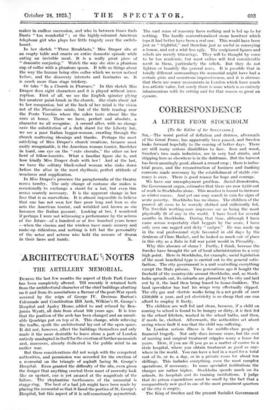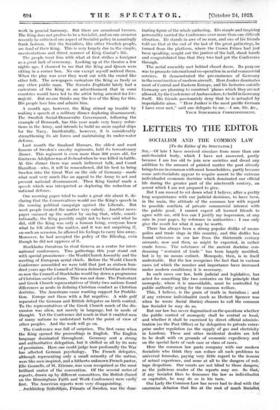CORRESPONDENCE
A LETTER FROM STOCKHOLM
[To the Editor of the Srse-r.vroa.1 Sia,—The worst period of deflation and distress, aftermath of the Great Peace, has apparently been passed, and Sweden looks forward hopefully to the coming of better days. There are still many serious disabilities to face. Iron and wood, Sweden's two main industries, are in very bad straits, and shipping here as elsewhere is in the doldrums. But the harvest has been amazingly good, almost a record crop ; there is indus- trial peace, and the reconstruction of business and banking concerns made necessary by the establishment of stable cur- rency is over. There is good reason for hope and courage.
We have our unemployment problem. Social-Demokraten, the Government organ, estimates that there are now 4,000 out of work in Stockholm alone. This number is bound to increase as winter comes. And yet one may search in vain for signs of acute poverty. Stockholm has no slums. The children of the poorest all seem to be warmly clothed and sufficiently fed. The Swedish working-man impresses me as being the most physically fit of any in the world. I have lived for several months in Stockholm. During that time, although I have come across respectably clad beggars by the score, I have only seen one ragged and dirty " cadger." He was made up in the real professional style favoured in old days by the denizens of Clam Market, and he looked as much out of place in this city as a Zulu in full war paint would in Piccadilly.
Why this absence of slums ? Partly, I think, because the Swedes have brought the art of local administration to a very high point. Here in Stockholm, for example, social legislation of the most beneficial type is carried out to the general satis- faction. The city government is a unit controlling everything except the State prisons. Two generations ago it bought the freehold of the countryside around Stockholm, and, as Stock- holm spreads out, its suburbs are planned by the city and laid out by it, the land then being leased to house-builders. The land speculator has had his wings very effectually clipped. The city gas and electric works bring in a net profit of over £500,000 a year, and yet electricity is so cheap that one can afford to employ it freely.
The children are well fed and clean, because, if a child on coming to school is found to be hungry or dirty, it is first fed in the school kitchen, washed in the school baths, and then, if needs be, clothed. Afterwards, the authorities set about seeing whose fault it was that the child was suffering.
In London serious illness is for middle-class people a financial tragedy. Not only does income cease, but the cost of nursing and surgical treatment cripples many a home for years. Here, if you are ill you go as a matter of course to a civic hospital, where you obtain treatment as good as any- where in the world. You can have a bed in a ward for a total cost of 3s. or 4s. a day, or in a private room for about ten shillings. This includes everything, even the most complex operations, if necessary. In some specialist institutions the charges are rather higher. Stockholm spends much on its schools, its hospitals and its training institutions. I judge that its prison expenditure must be small by the fact that a comparatively new gaol in one of the most prominent quarters of the city is empty.
The King of Sweden and the present Socialist Government
work in general harmony. But there are occasional breezes. The King does not profess to be a Socialist, and on one occasion recently he criticized one aspect of Socialist policy in amazingly frank fashion. But the Socialists, like other Swedish people, arc fond of their King. This is very largely due to the simple, unostentatious and direct manner of King Gustaf's life.
The people treat him with what at first strikes a foreigner as a great lack of ceremony. Looking up at the theatre a few nights ago, I chanced to see that the King and Queen were - sitting in a corner box. No one except myself noticed them. When the play was over they went out with the crowd like other folk. The newspapers caricature the King as freely as any other public man. The Svenska Dagbladet lately had a caricature of the King in an advertisement that in some - countries would have led to the artist being arrested for lls.7- majeste. But no one thinks any the less of the King for this. His people love him and admire him.
A month ago, however, the King stirred up trouble by making a speech at a military dinner deploring disarmament. The Swedish Social-Democratic Government, following the example of Denmark, has this year made very heavy reduc- tions in the Army, and intends to build no more capital ships for the Navy. Incidentally, however, it is 'considerably strengthening its air forces and maintaining its under-water defence.
Last month the Smaland Hussars, the oldest and most famous of Sweden's cavalry regiments, held its tercentenary dinner. This regiment is even more than 300 years old, for Gustavus Adolphus was at its head when he was killed in battle. At this dinner there was much indiscreet talk, and Count Hamilton—who, it will be remembered, did his best to bring Sweden into the Great War on the side of Germany—made what read very much like an appeal to the Army to act and prevent national disarmament. Then King Gustaf made a speech which was interpreted as deploring the reduction of national defence.
One morning paper tried to make a great stir about it, de- claring that the Conservatives would use the King's speech in the coming political campaign against the Liberals. But most people treated the matter very calmly. Another news- paper summed up the matter by saying that, while, consti- tutionally, the King possibly ought not to have said what he did, still the King was only a human being, everyone knew what he felt about the matter, and it was not surprising if, on such an occasion, he allowed his feelings to carry him away. Moreover, he had accepted the policy of the Riksdag, even though he did not approve of it.
Stockholm threatens to rival Geneva as a centre for inter- national conferences. Two gatherings this year stand out with special prominence—the World Church Assembly and the meeting of European aerial chiefs. Before the World Church Conference assembled we were told that just as sixteen hun- dred years ago the Council of Nimes defined Christian doctrine so now the Council of Stockholm would lay down a programme of Christian social reform. This was not done. The Protestant and Greek Church representatives of thirty-two nations found differences as acute in defining Christian conduct as Christian doetrine. The Americans came wanting support for Prohibi- tion. EuroPe met them with a flat negative. A wide gulf separated the German and British delegates on birth control. To the representatives of the Greek Church much of the dis- cussion was alien, not merely in language, but in mode of thought. Yet the Conference did much in that it enabled men' of many nations to understand better the point of view of other peoples. And the work will go on.
The Conference was full of surprises. The first came when the King opened the proceedings in English. The English language dominated throughout. Germany sent a strong and authoritative delegation, but it chilled us all by its note of pessimism: Here one could judge how profoundly the War has Affected German, psychology. The French delegates; although representing, only a small minority of the nation,' were like men inspired, and a hitherto unknown:French pastor, Elie Gounelle, of St. Etienne, was soon recognized as the most brilliant orator of the convention. Of the several series of reports, drawn up by different committees, the British (baied- on the Birmingham Faith and Work Conference) were easily` first. The Americin reports were very disappointing. Archbishop Soderbl?m, Primate of Sweden, was the dom:
hutting figure of the whole gathering. His simple and inspiring personality carried the Conference over more than one difficult situation. He stands in awe of no man, and one of hii friends told me that at the end of the last of the great gatherings, he turned from the platform, where the Crown Prince had just been speaking, sought out the janitor of the hall, shook handi and congratulated him that they two had got the Conference through.
The aerial assembly met hehind closed doors. Its purpose , o. was to promote international c -operation in aerialcommercial services. It demonstrated the pre--eminence of Germany in the construction of mOdern aircraft. Herr Junker dominates most of Central and Eastern Europe, and his factories outside Germany are planning to construct et 'planes which they are not allowed, by the Conference of Ambassadors, to build in Germany, itself. His friends passionately deny that he is actuated by, imperialistic aims. " Herr Junker is the most pacific German































































 Previous page
Previous page